Gladiators: The serious business behind ITV's prime-time 'panto'
- Published
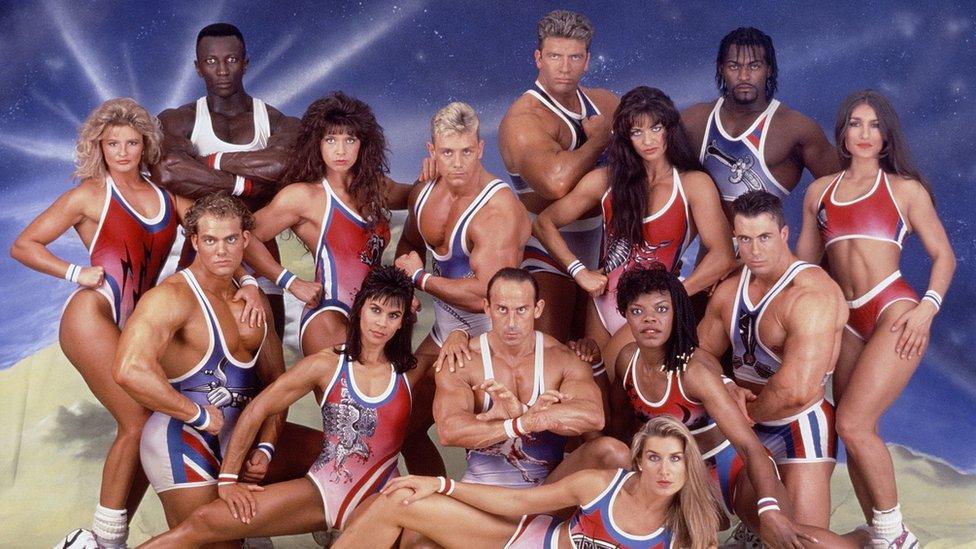
Returning to screens on Saturday with a high-octane mix of entertainment and athleticism, the BBC will be hoping its Gladiators reboot can replicate the programme's 1990s success. While critics mocked its arena battles as mindless play-acting, the fight to get them on screen was a serious business.
"I'll never forget the moment I heard a 'pop'," recalls Diane Youdale as she details the fall that left her "one step too close" to breaking her neck.
Rugby-tackling a contestant at height, the 26-year-old - known to millions of fans as Jet - had smashed down awkwardly on the crash mats below with the challenger's body wrapped around her.
"They stretchered me out and, as I was lying in an ambulance in agony, I thought I'm going to roll away while my limbs still work. I've done my four years, it's time to bow out."
Introduced as "Gladiators' very own Wonder Woman" in the programme's first episode, Youdale's backflips and hair flicks saw her win over audiences as she competed against members of the public in a range of physical challenges.
ITV's gamble on the new format turned into a Day-Glo phenomenon and became, the childhood gymnastics champion says proudly, "a Saturday-night ritual".
But the toll was punishing and that injury, inflicted at a non-televised event at Wembley Arena in 1996, proved decisive.
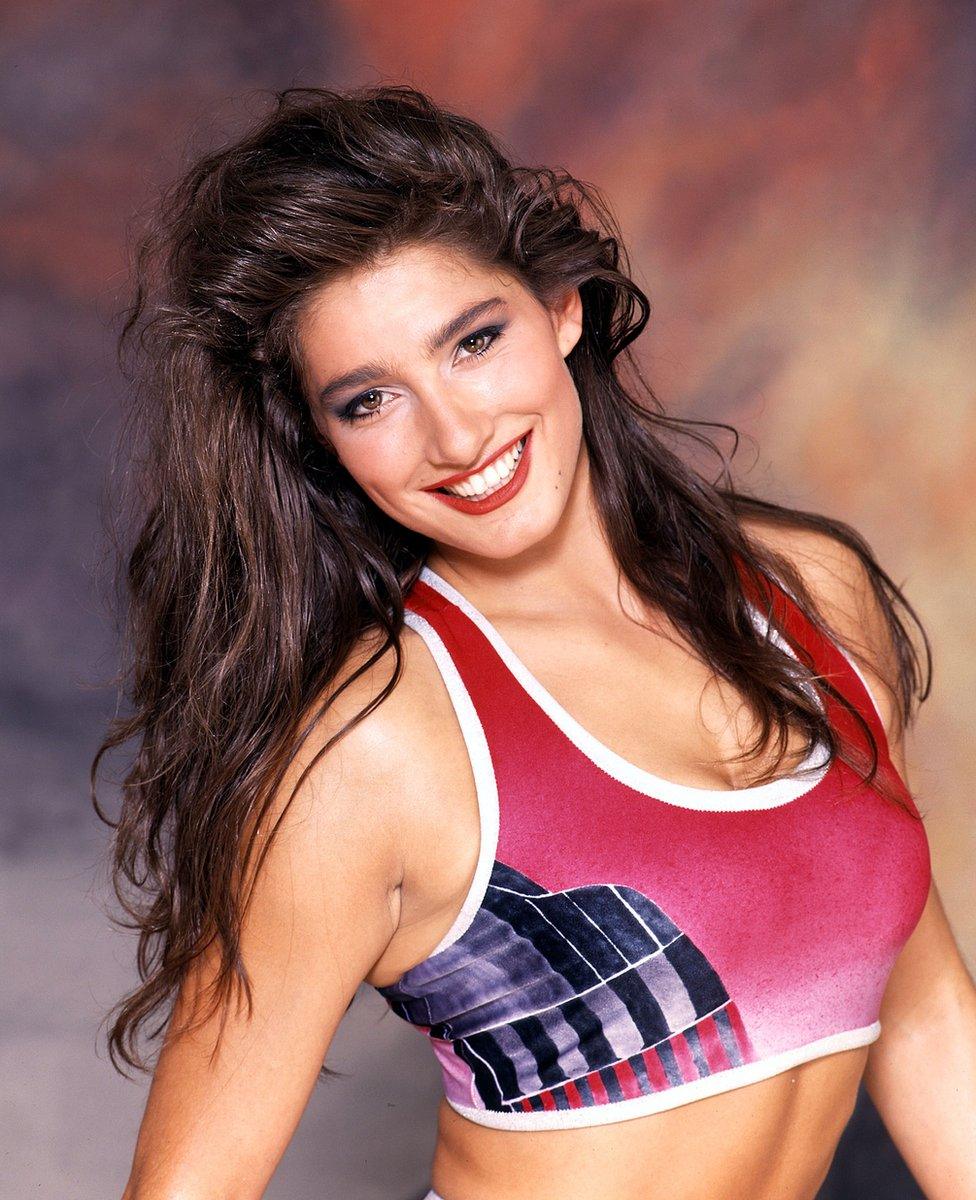
Diane Youdale was cast as Jet, with commentator John Sachs announcing she looked "ready for take-off" in episode one
Jet's ups and downs mirrored the programme's own journey as, behind the scenes, it had taken an almighty effort to convince commissioning chiefs of its potential and a further struggle to assemble the right team of pumped-up participants.
Youdale, who moved to London from Billingham, on Teesside, in the mid-1980s to study dance, remembers working as a "jobbing actor" and choreographer.
Approached by producers, her place was secured by "blitzing" an Army assault course at Woolwich Barracks in early 1992.
Familiar with the American version of the programme, she initially believed she was being asked to audition as a contestant and, at 5ft 6ins (1.67m) and 9st 6lbs (60kg), feared being "beaten up".
"Those people [on the US show] looked like animals - bodybuilders and very strong wrestler types. There was me - a little dancer!
"LWT (London Weekend Television) didn't have a big pool of people to draw from. They'd scoured magazines and looked at the fitness industry, but back then bodybuilders weren't what we call functional athletes.
"They couldn't run to catch a bus for a million pounds.
"I think it took them two or three years to get it right. They'd cast someone and then realise that person couldn't cut it in the arena, or wasn't popular or good on camera."
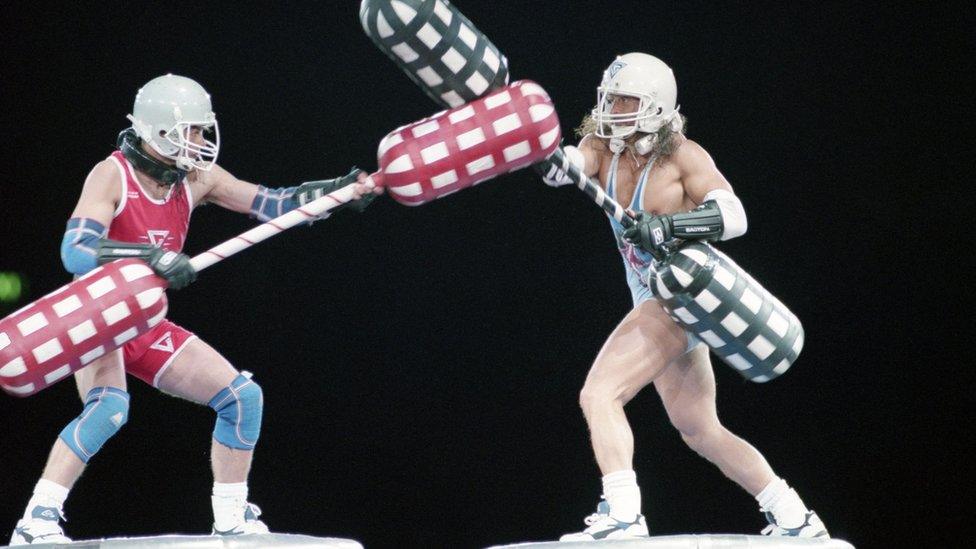
Duel's pugil sticks were often mocked, but one of the show's directors says there was "nothing Toytown" about the clashes
First broadcast on ITV on 10 October 1992, along with Blind Date and Beadle's About, and regularly pitched against the "Gotchas" and gunge tank of Noel's House Party on BBC One, it was like nothing seen before in that sought-after slot.
The Lycra-clad combatants, including Wolf, Warrior, Shadow and Cobra, became household names thanks to their prowess in the likes of Hang Tough and Duel, with challengers traversing an exhausting assault course in the Eliminator showdown.
Where the US version was studio-bound with a small audience, producers in the UK envisaged glitz, glamour and atmosphere.
Filmed at Birmingham's National Indoor Arena, pop classics were employed alongside the G-Force cheerleaders to "hype up" the crowds of thousands.
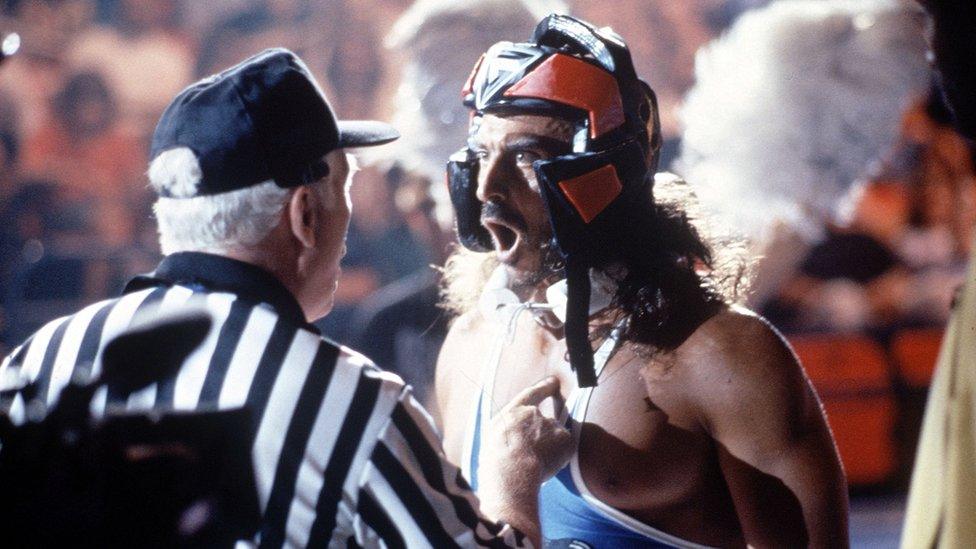
Wolf - regularly admonished by referee John Anderson - took on the role of pantomime villain
LWT director Jonathan Glazier, who joined the programme from the third series, describes it fondly as "a panto" with "something for all the family".
Financial considerations, though, brought plenty of pressure.
"That Saturday slot was hugely important," he explains. "The channels were in a fight for the audience and it was going to be expensive to make."
Often following the sun-soaked Baywatch adventures of Pamela Anderson and David Hasselhoff, one key to Gladiators' success was that "people genuinely loved - or loved to hate - the characters", explains the television critic, Ian Hyland.
"Also, you rooted for the members of the public. Remember, this was back in the days when normal people being on TV was still quite unusual."
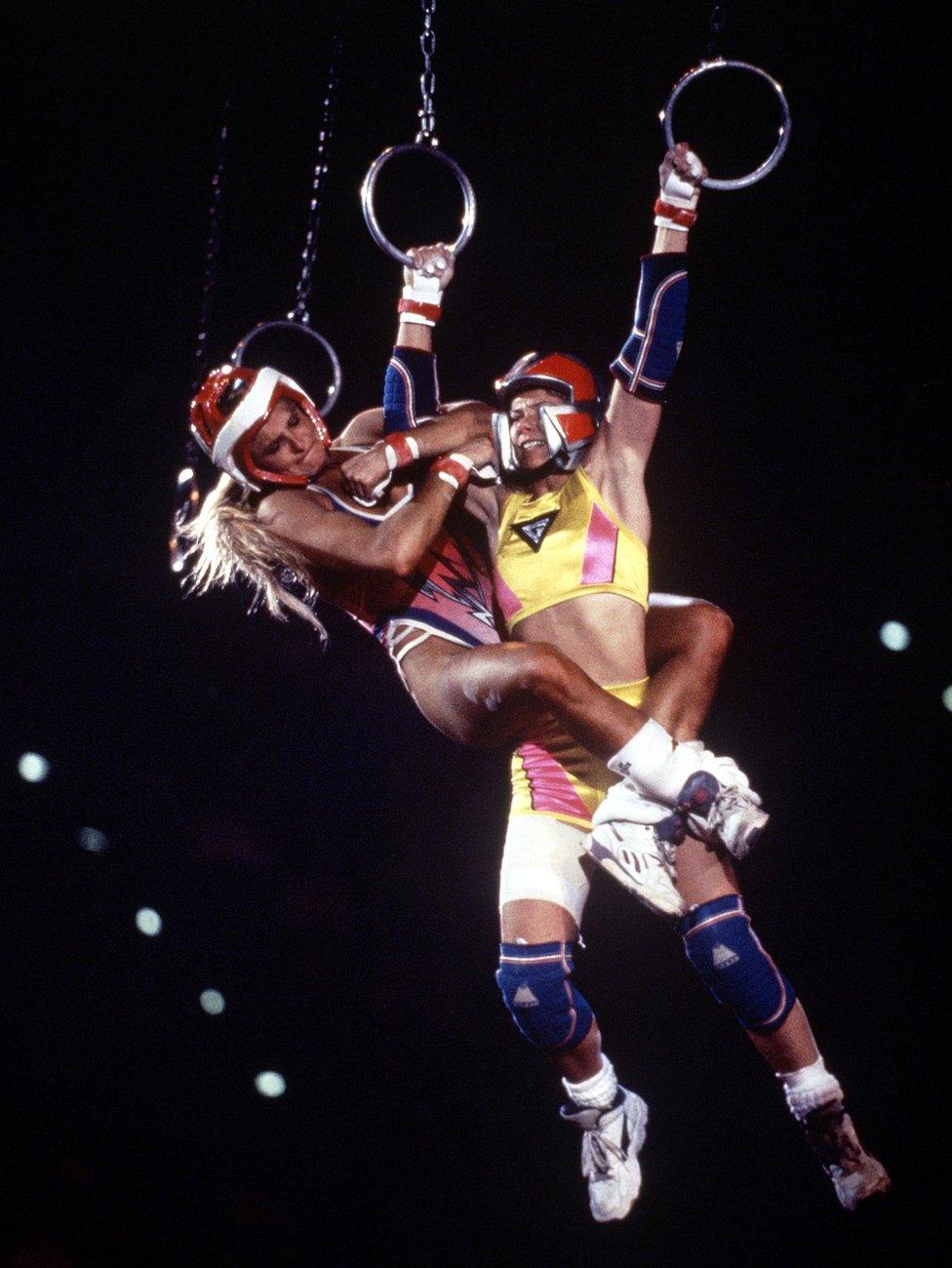
Games such as Hang Tough challenged Gladiators and contenders to their limits
While the programme was "going gangbusters" by the time Glazier stepped into the director's chair, he reveals the earliest shows required a creative approach.
"At the start, nobody quite knew what it was and so the arena wasn't always full," he says.
"You had the wonderful spectacle of moving half the audience from one side to the other [to hide empty seats] and making it all work in the edit.
"People used to make jokes about it being a glorified pillow fight, but if you've ever been on the receiving end of those pugil sticks [used in Duel] you'll understand there's nothing Toytown about it."
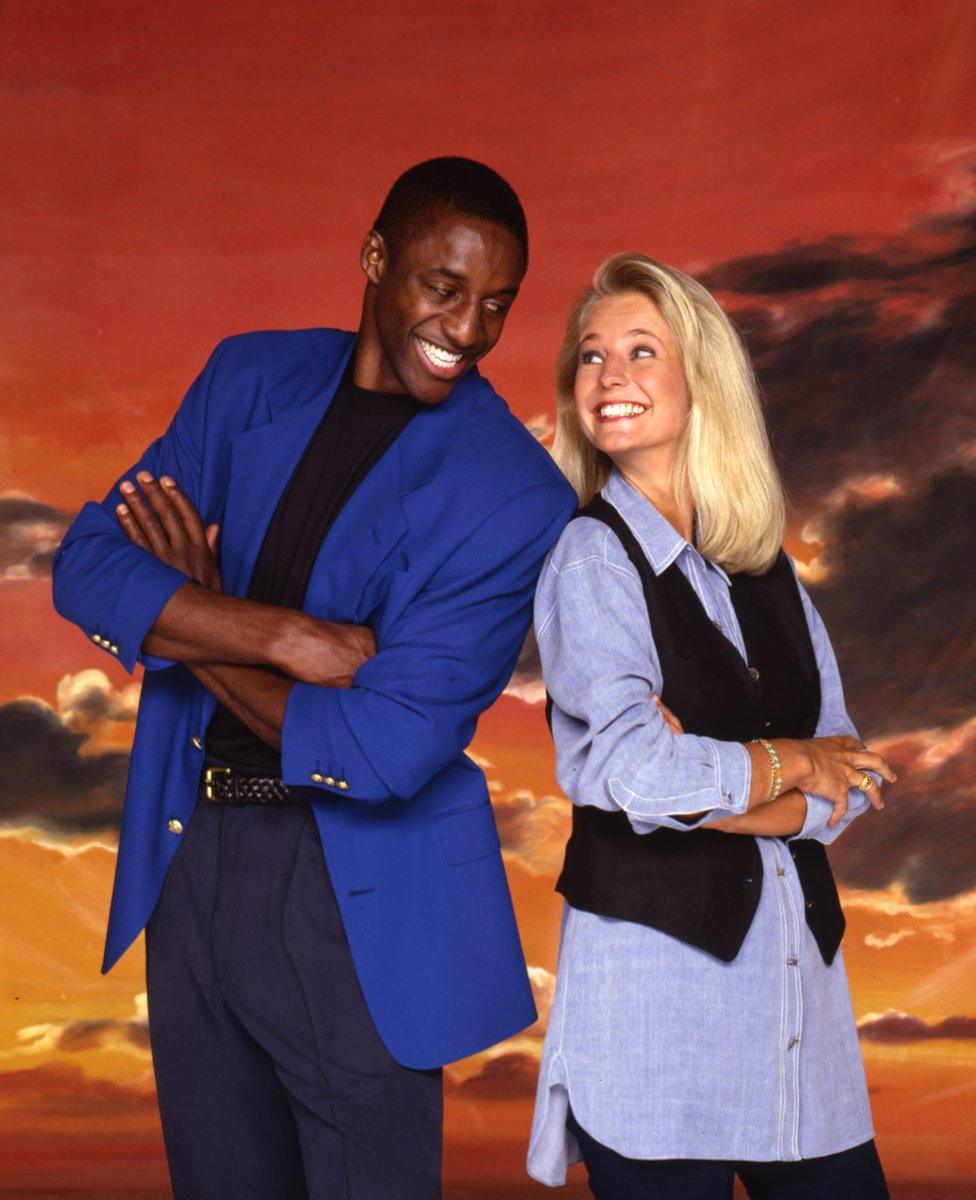
Bringing a sporting link, footballer John Fashanu hosted alongside former TV-am weather presenter Ulrika Jonsson
As millions watched, Youdale enlisted her mum to handle sacks of fan mail. It was at times an "uncomfortable" level of attention.
"Once the show had gone out it was difficult to hide," she says. "But because it was such a positive programme it was never awkward or awful. It could've been very different."
Further tension arrived with annual contract reviews as producers monitored the cast's performance and popularity, while scandals including Shadow being sacked over drug allegations attracted a fierce tabloid spotlight.
Help was at hand, though.
"The idea was to keep the ship as happy as possible," says Glazier. "They were regular folk when they came to us.
"The machine of ITV was there to help protect them by managing their personal appearances, and contracts were as level and fair as they could be."
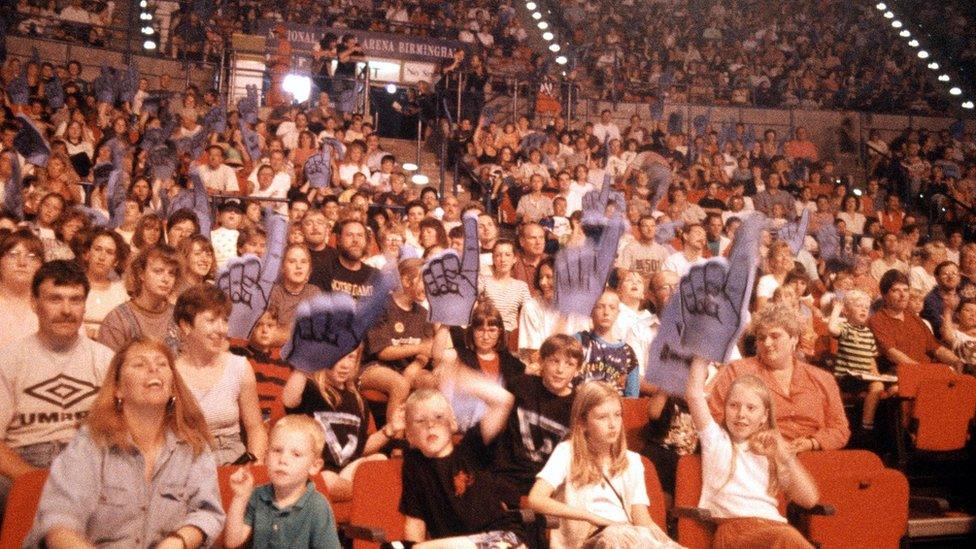
Giant foam fingers were a common sight among audience members cheering on the action
Having exited the stage, Youdale sought a future away from "the bright lights", fulfilling an ambition to study counselling and psychotherapy.
And with viewing figures falling, Gladiators' final programme was broadcast in January 2000. On the horizon was the reality TV juggernaut that has dominated Saturdays ever since.
"We knew live television was where it was heading," says Glazier who is now based in Singapore as executive producer and director of Asia's Got Talent.
"The elimination singing format was perfect for that and it sustained ITV and the BBC for years."
Now, following a short-lived reboot on Sky in 2008-09, the BBC is resurrecting Gladiators with Bradley Walsh and son Barney presenting. Is it fighting a losing battle though?
Youdale, who reflects on the 90s incarnation co-hosting the GladPod podcast, is confident it will find an audience.
"The odds are against it [having the same cultural impact] because it was new and we only had four or five channels, but with a prime-time slot it will get the energy it needs," she says.
"I'm really excited."
Gladiators starts on Saturday 13 January at 17:50 GMT on BBC One and iPlayer
Related topics
- Published2 June 2023

- Published10 January 2024